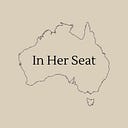Amanda Rishworth: Passionate about access
“I realised I wanted to try and make a difference on a larger scale”
Almost 100 years ago, Edith Cowan became the first woman elected to an Australian parliament, in March 1921.
In Her Seat is asking as many currently serving female politicians as we can how they view gender equality, politics and their impact.
This is a non-partisan project that is soliciting contributions from women in all parties, or none at all, in every parliament.
Amanda Rishworth is the Member for Kingston, from South Australia, in the Federal Parliament.
Amanda was first elected in 2007, at age 29, and held parliamentary secretary positions focused on the environment and carers. In opposition, she has become a formidable voice on childcare and education issues, as shadow minister.
Prior to parliament, Amanda was a psychologist. She had also worked as a union organiser and was president of youth-wing of the Australian Labor Party.
What does gender equality mean to you?
To me, gender equality means every person having equal opportunity regardless of their gender.
It means every person has the same opportunity to study, work, earn a decent wage, realise their potential and enjoy quality of life.
We will only achieve true equality once gender is never a factor in determining things like how much someone earns, whether they receive a promotion, or whether they can even get their foot in the door.
Importantly, gender equality also means no one should be subject to discrimination, violence or negative treatment because of their gender.
Which female politicians have inspired or encouraged you?
My fellow South Australian Anne Levy was a trailblazer, who lead the way in policy areas like child care, maternity leave and equal pay. I am fortunate enough to have come to know Anne well over the years, so she has both inspired and encouraged me.
What inspired you to serve your community?
Before I was a Member of Parliament I was a clinical psychologist, and in that role I was able to make a difference to people’s lives on a personal level.
Although I loved this work, I began thinking about how I could continue making a difference, but to whole communities or our society as a whole.
There were many things I was deeply passionate about — mental health of course, but also that everyone should be able to receive a quality education, attain a secure job, and have access to affordable healthcare, no matter their background or where they live. I realised I wanted to try and make a difference on a larger scale.
What are the most important contributions you are making in Parliament?
I am honoured to be the Shadow Minister for Early Childhood Education and Development — an area I am passionate about as a female and a mother. Ensuring early education is affordable, accessible and high quality is so important not only to the development of children, but also in ensuring parents, particularly mothers, are able to return to work and forge successful careers if they want to.
I believe affordable child care is one of the most pivotal policy areas in our fight for gender equality.
What is next for gender equality in politics?
The Labor Party has made significant progress when it comes to achieving gender parity in our Caucus, and for a long time now gender equality has been front and centre of our party — whether that is affirmative action, continuing the annual Women’s Budget Statement, or ensuring all legislative decisions are looked at through a gender equality lens.
In my opinion there remains far too few women in the Federal Cabinet, and I hope we will see that change over coming years no matter which party is in office.
In Her Seat interviews can be accessed here
